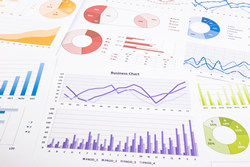In recent weeks we’ve posted articles relating to how companies are seeking to improve supply chain visibility and use AI to interpret information from the supply chain into actionable data. These initiatives need to be underpinned by having big data and advanced analytics in place across the supply chain. It sometimes feels that, at present, big data, analytics, supply chain visibility and certainly AI are more concept than reality for most supply chain professionals and so it has been interesting to read a recent study by The Hackett Group.
The study, entitled “Analytics: Laying the Foundation for Supply Chain Digital Transformation” looks at how analytics is currently providing valuable insight into the supply chain and how it is driving improvements in its performance. The study questioned influential supply chain leaders and analysed their opinions and thoughts on the subject in relation to their business needs and industry settings.
Before discussing the report’s findings, we should firstly clarify what is meant by analytics, or advanced analytics, and put it into context with the other increasingly discussed initiatives of big data, supply chain visibility, AI and digitalisation.
Supply chain analytics in context
 In a nutshell, big data is the recording of activity in the supply chain, supply chain visibility is about having access to that data and analytics is about analysing that data and making decisions from it. Furthermore, AI can then potentially be used to make the analytics output prescriptive, in terms of an action plan, rather than passive, meaning that the user must interpret the information to develop their own plan. All these concepts are then wrapped up under the broader term of supply chain digitalisation.
In a nutshell, big data is the recording of activity in the supply chain, supply chain visibility is about having access to that data and analytics is about analysing that data and making decisions from it. Furthermore, AI can then potentially be used to make the analytics output prescriptive, in terms of an action plan, rather than passive, meaning that the user must interpret the information to develop their own plan. All these concepts are then wrapped up under the broader term of supply chain digitalisation.
What is supply chain analytics?
Analytics takes the form of a tool-set, driven from a single system or multiple interfaced systems, that takes the big data from the supply chain (sales data, logistics data, demand signals and so on) and analyses that data to provide insight and support decision making. It’s important to know that analytics effectively has three tiers of capability.
The three tiers of supply chain analytics

Firstly, there are descriptive and diagnostic analytics. These can be considered the most basic forms of analytics and their insights are passive: they don’t suggest actionable plans and it is for the user to identify potential scenarios and formulate their own decisions. Secondly, there is predictive analytics which identifies potential scenarios for evaluation, but still requires the user to formulate a decision from these scenarios. Finally, the third tier is prescriptive analytics which models scenarios and offers actionable plans. It is this third tier that is generally referred to as advanced analytics and it is also this third tier where AI is coming into play.
What the study revealed…
The first key finding that the study uncovered was that 66% of supply chain leaders felt that advanced supply chain analytics was going to play a key role in their operations over the next 2-3 years. The results showed that many supply chain leaders were pushing for getting advanced analytics implemented within their business, as they could see how useful it could be to both operations now and in the future. There was also interest in ensuring that analytics could provide a holistic overview of their entire supplier network, giving them greater transparency and visibility over their complete operations.
 The second finding discovered that supply chain leaders thought analytics had the greatest potential to improve forecasting accuracy, leading to optimised transportation performance, improved product tracking and traceability and analysis of product returns. It was felt that there were currently known knowledge gaps in each of these areas where analytics could provide real insight. For example, industries who were regulated by strict laws such as food standards or medical supply laws felt the potential for tracking and traceability was huge and would greatly benefit their business.
The second finding discovered that supply chain leaders thought analytics had the greatest potential to improve forecasting accuracy, leading to optimised transportation performance, improved product tracking and traceability and analysis of product returns. It was felt that there were currently known knowledge gaps in each of these areas where analytics could provide real insight. For example, industries who were regulated by strict laws such as food standards or medical supply laws felt the potential for tracking and traceability was huge and would greatly benefit their business.
Thirdly, the study showed that respondents felt advanced analytics would aid production optimisation and sourcing. They believed that it would help this area of their business so much that 56% of respondents said analytics would comfortably reduce their total landed costs.
Finally, the study interestingly highlighted that 44% of respondents were looking to make improvements and enhancements to their Enterprise Resource Planning (ERP) systems, specifically the ERP’s functionality and integration. They wanted to do this in order to gain greater supply chain visibility (from big data). The study showed that currently many supply chain leaders were using legacy ERP systems to manage their supply chain operations and using advanced supply chain analytics to understand the entire supply chain process. They felt that they could implement virtual collaboration platforms both for internal and external practices and wanted to make this task a key technology priority over the coming years.
This study has provided us with useful insight into how supply chain leaders perceive the impact that advanced analytics will have on their companies and help drive their business objectives.
It is fascinating to note that over 94% of respondents felt that advanced analytics would fundamentally change the way that they operated their supply chain. However, it should also be noted that supply chain leaders have a lot of work to do in preparation for this digital transformation as only 44% of respondents said they had a strategy in place that was ready to implement.
The way that analytics will influence digital transformation is astounding and the way that it will revolutionise supply chains in 2018 and beyond is an interesting space to watch. We will keep you up to date on all the news and changes in this area to ensure that you stay ahead of the effects that analytics can have on your operations.
The team at Paul Trudgian are here to provide expert consultancy and advice on all aspects of the supply chain. Whatever supply chain or logistics challenges you face you can contact us on 0121 517 0008 or email [email protected]



